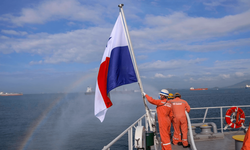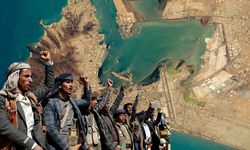During the council's inaugural formal meeting of 2024, a strong demand was made for the release of the Galaxy Leader, a Japanese-operated cargo ship associated with an Israeli company. The vessel, along with its crew, was seized by the Houthis on Nov. 19.
While some council members urged immediate action to curb Houthi missile and drone attacks, no formal steps were taken during the open session, with the matter moving to closed consultations.
Chris Lu, a U.S. representative to the United Nations, characterized the situation as an "inflection point," stressing the severe implications of these attacks on maritime security, international shipping, and commerce. Lu underlined the potential consequences for the fragile humanitarian situation in Yemen, risking aid deliveries to the war-torn nation.
The Iran-aligned Houthi rebels, controlling a significant portion of Yemen, have launched multiple drones and missiles at over 20 ships since Nov. 19. The group claims these actions are in solidarity with Palestinians in Gaza, targeting vessels with Israeli connections or en route to Israel. However, several targeted vessels had no Israeli links, leading major shipping lines to suspend operations through the Red Sea.
In response to escalating tensions, the United States and other nations established Operation Prosperity Guardian, a naval task force dedicated to protecting civilian vessels. U.S. warships have intercepted Houthi-fired weapons, sinking Houthi speed boats in a recent incident.
Prior to the Security Council meeting, the U.S. and 12 other countries issued a joint statement warning that the Houthis would bear responsibility for the consequences if the attacks persisted.
During the session, representatives from the U.S., U.K., and Israel accused Iran of supporting the Houthi strikes, an allegation Iran denies. The root cause of the issue, according to Russian Ambassador Vassily Nebenzia, lies in the conflict between Israel and Hamas in Gaza. He criticized the U.S. for blocking resolutions calling for a ceasefire.
Addressing the matter, Chinese foreign ministry spokesperson Wang Wenbin emphasized the Red Sea's importance as a crucial shipping lane for international trade and energy. China opposes attacks on civilian vessels and called for all parties to play a constructive and responsible role in safeguarding the security of shipping lanes in the Red Sea.






